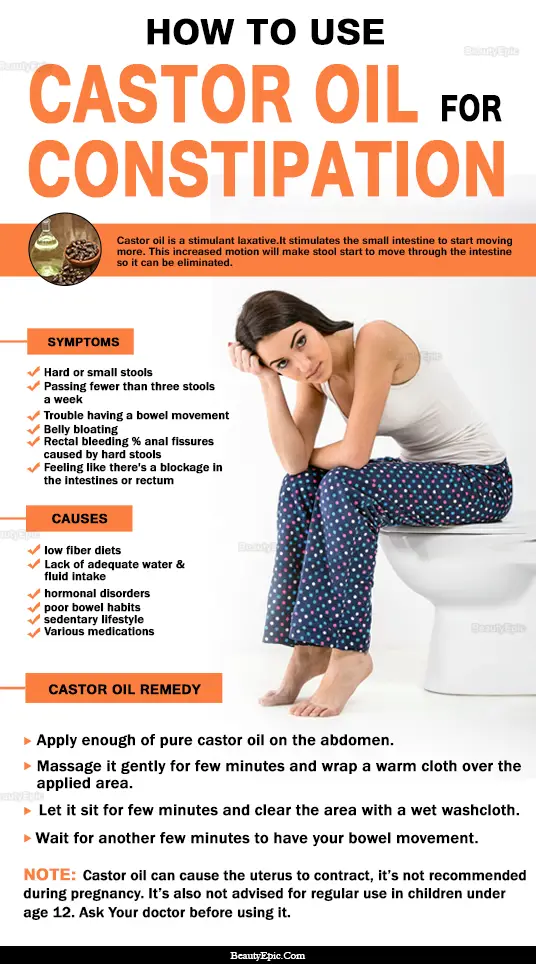
Important: This article is for informational purposes only. Please read our full disclaimer for more details.
Although constipation is not a serious disease, it can cause lot of discomfort. The balance of the food intake and excretion plays a vital role in everyone’s life. Constipation hinders the same and causes the bowel movement to slow down, causing serious discomfort. Natural remedy like the castor oil is a very useful and easy remedy for constipation. Here are some effective home based ways to use castor oil for constipation relief.
Does Castor Oil Help With Constipation?
If you are experiencing occasional constipation then castor oil is perhaps the best remedy for the situation. However if constipation occurs for a prolonged period of time then it is essential that one must consult a doctor immediately. Castor oil helps in following ways.
- It acts as a stimulant.
- It helps to lubricate the bowels without drawing water from the walls of the intestine.
- It increases the movement of the intestine.
How To Use Castor Oil for Constipation Relief
1. Castor oil and Milk for Constipation
This is a readily available remedy found in any household.
You’ll need:
- 1 teaspoon of castor oil
- 1 glass of cold milk
Preparation time: 3 minutes.
How to do:
- Mix one full teaspoon of castor oil to a glass of cold milk.
- Stir it well.
- This mixture must be consumed once a week for cleansing the stomach.
Repetitions: Consume this drink once a week.
2. Castor oil and Orange Juice for Constipation
You can make your castor oil consumption delicious with orange juice. At the same time enjoy the benefits of the fibers to ease your constipation.
You’ll need:
- castor oil
- orange juice
Preparation time: 5 minutes.
How to do:
- Mix equal proportions of castor oil and orange juice.
- Stir the mixture well.
- Consume it on an empty stomach.
- Follow it up by drinking hot water every 20 minutes 3-5 times.
- Once the stomach is light and clean, yogurt can be consumed for its cooling effect.
Repetitions: Once a week.
[ Read: How to Use Coconut oil for Constipation ]
3. Warm Water and Castor Oil for Constipation
It is a traditional way to improve metabolism.
You’ll need:
- 1 teaspoon castor oil
- 1 cup of hot water
Preparation time: 3 minutes.
How to take:
- Add one teaspoon castor oil to a cup of hot water.
- It should be stirred well so that the castor oil does not stick to the bottom of the cup.
- Drink this on an empty stomach, twice a week.
Best time to drink: Empty Stomach.
Repetitions: Twice in a week.
[ Read: How Banana Help in Constipation ]
4. Castor oil Massage for Constipation
This method helps to detoxify your body from the outside.
You’ll need:
- castor oil
- cloth or towel
Preparation time: 2 minutes.
How to do:
- Rub castor oil on your stomach.
- Then cover this with a cloth or a towel and place a hot bottle of water for 45minutes to an hour.
How it works: This method helps to detoxify the body and open up any blockage in stomach and intestine.
Repetitions: Twice a week.
[ Read: How Does Coffee Help Constipation ]
Tips and Precautions
- People are generally able to consume castor oil without any side effects. However some people experience certain effects for which precautions need to be taken.
- In case you have taken castor oil for 7 consecutive days with no relief from constipation; it is advised that you see your doctor.
- Pregnant women should refrain from consuming castor oil unless prescribed by the physician.
- Abdominal pain, cramps, nausea, diarrhea are some common side effects. These are generally short lived. However if they persist one must consult the doctor.
If rashes or itching occur over a large portion of the body, then consult the doctor at once.
You Might Also Like:
- 20 Healthy Foods That Make You Poop Fast
- How to Use Olive Oil for Constipation Relief?
- Yoga for Constipation: 6 Best Yoga Asanas to Relieve Constipation
- 10 Easy Home Remedies for Constipation Relief
- What Is the Best Time to Drink Prune Juice for Constipation?
- 15 Foods That Helps to Relieve Constipation in Your Kids
- Can Constipation Cause Fever? Symptoms, Causes, Treatment
- Why Do I Cry When I Poop?
- Sticky Poop In Adults: Causes and Treatment
- How to Take Chia Seeds for Constipation
- How to Take Baking Soda for Constipation
- How Much Epsom Salt for Constipation
- How Effective is Prune Juice for Constipation
- 10 Best Foods For Constipation
Image:- 1
















